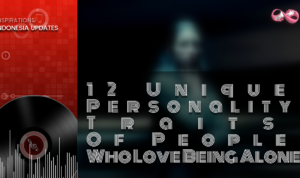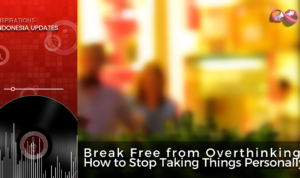INDONESIAUPDATES.COM, News En – It all started with a seemingly innocent comment at work. Sarah had been working hard on a presentation for weeks. She poured her heart into it, making sure every slide was perfect, every detail precise. When the day finally arrived, she presented it to her team with pride.
But then, after she was done, her manager said, “It was good, but I think it could have been more creative.”
Sarah’s heart sank. The word “good” got drowned out by the phrase “more creative.” It felt like a punch in the gut. Suddenly, her hard work didn’t matter anymore. Instead, she was fixated on one criticism, personalizing it, as if it was a reflection of her value.
That night, as she replayed the comment over and over in her head, something dawned on her: Why did one comment hold so much weight? Why couldn’t she let it go?
If this story feels familiar, you’re not alone. Many of us tend to take things personally—turning minor comments, setbacks, or even misunderstandings into a personal attack. But what if we could change that narrative?
Here’s Sarah’s journey of how she learned to stop taking things personally, and how you can, too.
1. Pause and Breathe
Sarah’s first step was learning to pause. When her boss made that comment, she felt her body tense up, her emotions surge. Instead of reacting, she took a deep breath. She realized that in the heat of the moment, our emotions can take control. Pausing allows us to step back, reflect, and prevent an emotional spiral.
Tip: The next time someone says something that stings, take a deep breath before you respond. It’s incredible how much clarity comes when we give ourselves that moment of calm.
2. Understand That It’s Not About You
One of Sarah’s biggest breakthroughs came when she realized: Most of the time, it’s not about you.
That comment about creativity? It wasn’t a personal attack on her skills. Her boss wasn’t insulting her; he was simply sharing his perspective. In fact, he might’ve been having a tough day himself.
Sarah started to see that people’s words and actions often reflect more about them—their experiences, frustrations, and state of mind—than they do about her.
Tip: Next time you take something personally, ask yourself, “Could this be more about them than it is about me?” Shifting this mindset can free you from unnecessary hurt.
3. Detach Your Worth from Opinions
Sarah had always tied her self-worth to external validation. When people praised her, she felt valued. When they criticized her, she doubted herself. But she began to understand that her worth wasn’t tied to what others thought of her work.
You are more than one comment or one opinion.
She began to separate feedback from her sense of identity, viewing it as a tool for growth rather than a measure of her value.
Tip: Remind yourself daily that your value doesn’t come from what others say. It comes from who you are and what you stand for.
4. Learn to Respond, Not React
Over time, Sarah learned the art of responding instead of reacting. Early on, she’d immediately get defensive when faced with criticism. But through practice, she started asking herself, “What’s the bigger picture here?”
She realized that instead of letting her emotions control her, she could control her emotions. The next time someone criticized her, she didn’t take it personally. Instead, she responded with curiosity, asking questions and seeing it as an opportunity to improve.
Tip: When you feel the urge to react emotionally, pause and ask yourself, “How can I respond calmly and constructively?”
5. Embrace Vulnerability
Sarah learned that taking things personally often stemmed from insecurity. But instead of running from it, she embraced her vulnerability. She acknowledged that, yes, some comments hurt, and that was okay. However, she didn’t let that hurt define her.
By accepting that we all have insecurities, Sarah was able to let go of the need for constant validation. She knew that her worth didn’t depend on always being right or perfect.
Tip: Embrace your vulnerabilities. They make you human, and acknowledging them can be the first step toward emotional freedom.
6. Focus on What You Can Control
One of the hardest lessons Sarah learned was that she couldn’t control what other people said or did. But what she could control was her reaction.
She started focusing on how she responded to situations rather than trying to change the people around her. By shifting her focus inward, she reclaimed her power.
Tip: Next time you feel hurt, ask yourself, “What part of this situation can I control?” The answer is almost always your reaction.
7. Practice Self-Compassion
In her journey, Sarah realized that she had been too hard on herself. Every time she took something personally, it chipped away at her confidence. But with time, she learned the importance of self-compassion.
Instead of beating herself up for not being “perfect,” she began treating herself with kindness. When she stumbled or felt hurt, she’d remind herself that she was doing her best and that it was okay to not have all the answers.
Tip: Be kind to yourself. Treat yourself with the same compassion you would offer a friend going through a tough time.
Final Thoughts: The Power of Letting Go
As Sarah continued to practice these steps, she noticed a change in herself. The comments that once kept her up at night no longer had power over her. She felt lighter, more confident, and more in control of her emotions.
Letting go of the habit of taking things personally doesn’t happen overnight, but with time, patience, and practice, it’s possible. Sarah’s story is a reminder that we have the power to choose how we react. By pausing, reflecting, and understanding that not everything is about us, we can free ourselves from unnecessary pain.
So the next time you’re faced with a comment that stings, remember Sarah’s journey. Let it go, focus on what truly matters, and take back control of your emotional well-being.
FOLLOW INDONESIAUPDATES.COM ON GOOGLE NEWS





